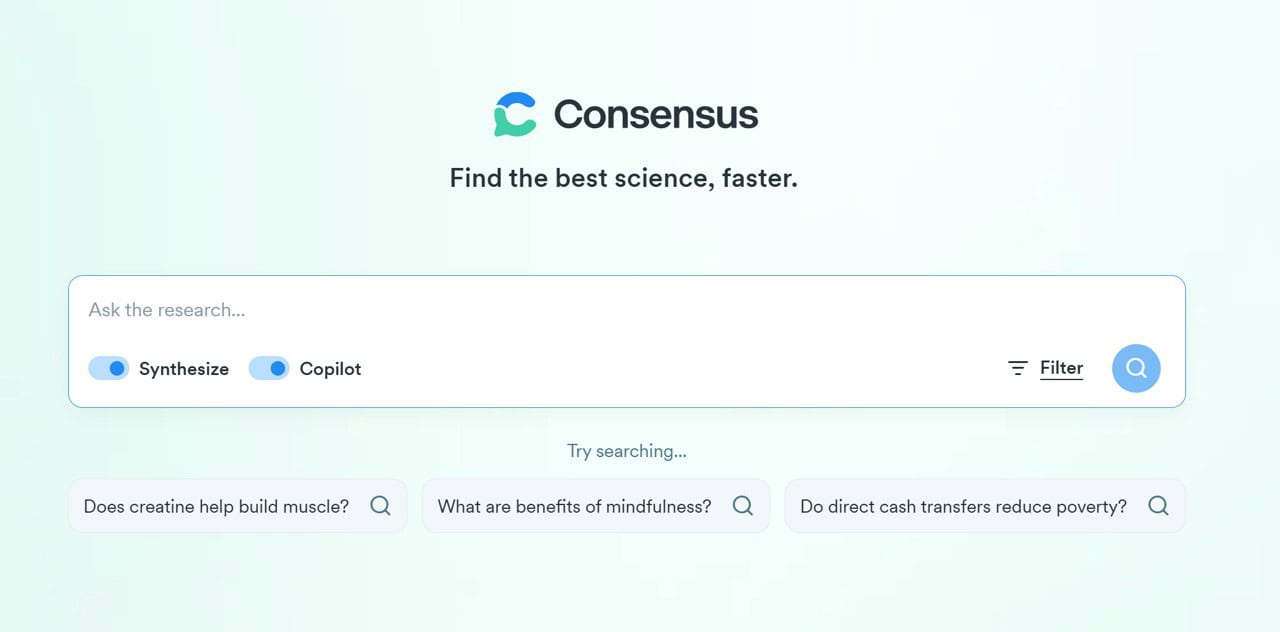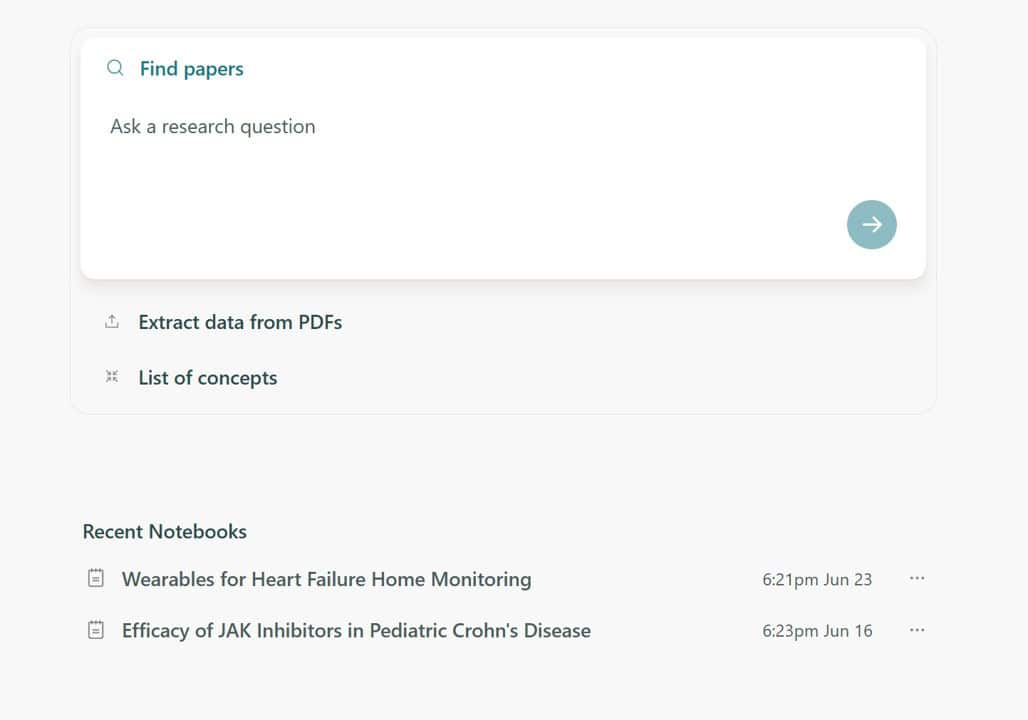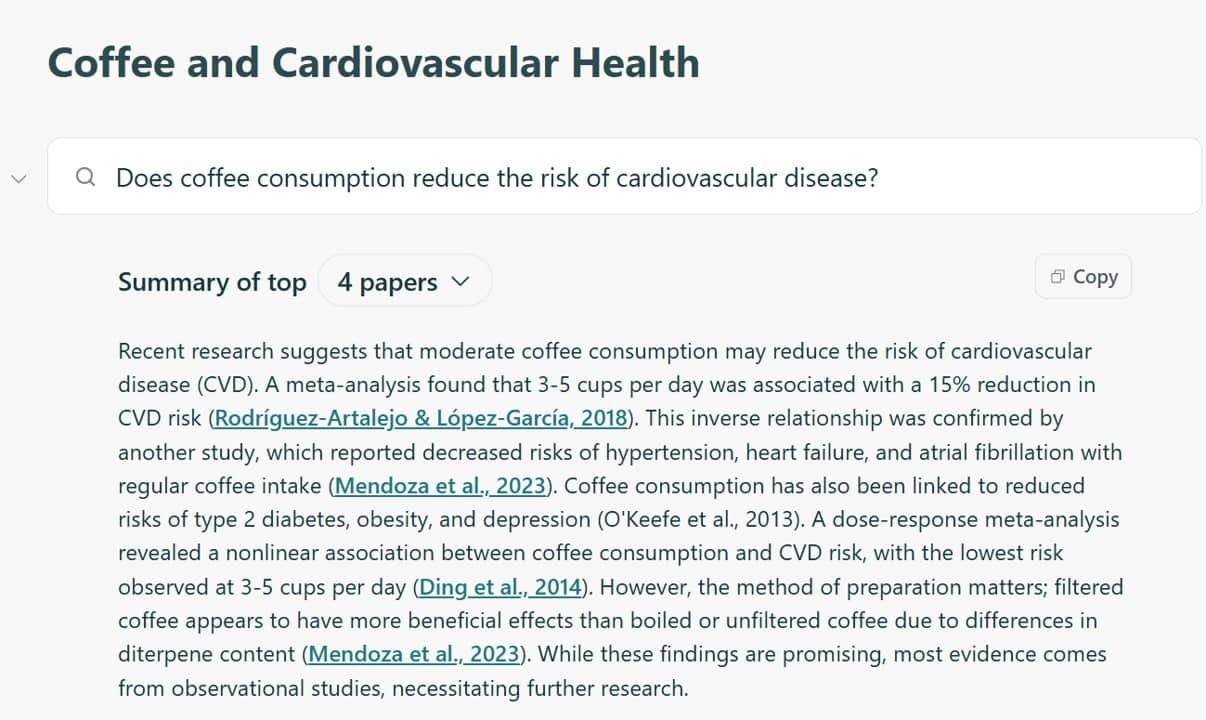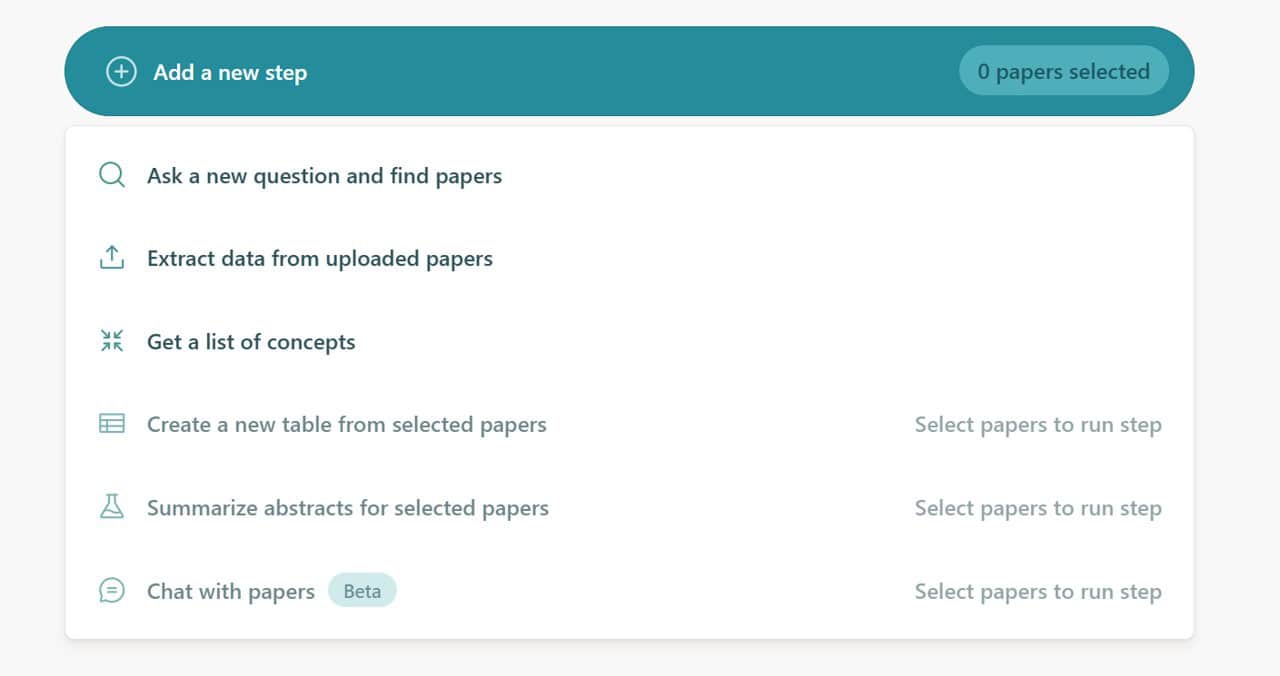Intelligent search engines.

Search engines have evolved to meet the changing demands of users. In the beginning, online searching was limited to finding web pages containing specified keywords. However, over time, search algorithms have advanced to better understand the context of queries, delivering more accurate and relevant results. Three such intelligent search engines are described: Consensus, Elicit, and Perplexity.
Do you remember those days when searching for scientific information was like digging for a hidden treasure? PubMed, our faithful friend from yesteryear, has always been there to bail us out of trouble. But, like everything in life, things change and evolve. Just as an old-school detective could be replaced by an artificial intelligence (AI) that can solve a case in seconds, the world of literature searching is seeing a revolution led by intelligent search engines that could replace our usual tools.
Imagine Consensus, Elicit and Perplexity, to name a few, as the superheroes of this new era of intelligent information searching. Equipped with cutting-edge AI, these intelligent search engines not only find what we need, but also understand the question before we finish asking it. They are like those friends who already know what pizza we like and order it for us before we decide. The era of getting lost in a sea of PubMed articles, trying to figure out which one is relevant, could be coming to an end.
The magic of these new intelligent search engines is not only in their speed and accuracy, but also in how they are redefining the way we access knowledge. With PubMed, we sometimes had to be almost detectives to find the right article. But with Consensus and company, the information is presented like a buffet, ready to be tasted. Will PubMed become the Blockbuster of bibliographic search, replaced by these new Netflix of knowledge? Keep reading this post and we will explore how these AI brainiacs are changing the game and what that means for the future of scientific research.
The search revolution
In today’s digital age, searching for information has become an everyday and essential activity for millions of people around the world. The problem is that the vast amount of information available, much of it of poor quality, and the need to quickly access relevant and reliable information, often turn this activity into a nightmare from which we run the risk of waking up without having found what we were looking for.
Although in the field of biomedical research we have specific search engines that allow for great control of the search, their use requires prior knowledge to structure the components that we will have to enter into the search engine to get the most out of it. This learning curve can be a bit steep at first, so many people get discouraged and look towards simpler search options, although much less specific and controlled.
Traditionally, search engines like Google have dominated this space, offering answers to a wide range of questions. However, as the amount of information available online continues to grow exponentially, so does the need for more sophisticated tools that can filter and synthesize this information more effectively, without the complexity of search engines like PubMed.
Search engines have evolved to adapt to these changing demands. In the beginning, online searching was limited to finding web pages that contained the specified keywords. However, over time, search algorithms have advanced to better understand the context of queries, offering more accurate and relevant results.
Most of these search engines no longer limit themselves to providing a list of web addresses, but instead try to directly answer the question that the user seems to want to answer.
But despite these advances, traditional search engines still face significant challenges, especially when it comes to complex queries or specialized topics that require deep analysis and synthesis of multiple sources of information.
Searching with intelligence
With the explosion of AI, search engines are beginning to incorporate these new technologies to refine their searches. The benefit of AI and the use of natural language processing techniques allow for a more personalized and efficient approach to searching for information.
Search engines can thus analyze and synthesize content to offer clearer, more contextualized and evidence-based answers. In this context, new search engines have emerged that have captured attention for their innovative approach. In this post we will talk about three of these intelligent search engines: Consensus, Elicit and Perplexity.
As we will see, each of these search engines has been designed with a specific purpose in mind, and their unique features make them especially valuable for different types of users.
Consensus: evidence in a click
Consensus is an intelligent search engine designed for those who need answers based on scientific evidence. Unlike other traditional search engines, Consensus uses AI techniques to analyze and synthesize large volumes of scientific literature (it has access to more than 100 million articles and publications), providing clear and data-based answers.
But this search engine does not stop there. Its main objective, which lives up to its name, is to help users find the “consensus” in the existing literature on a particular topic, reducing the time needed to review and understand the available information. This is achieved by showing the main articles that argue in the different possible directions in relation to the question asked.

The home page, as is usual in these intelligent search engines, is minimalist in design, showing us the search box, where we will have to write the question we are looking for an answer to. The first time you access it, it will ask you to open an account. You can open a free account to try it out, or if you’re not going to use it much, the easiest way is to log in with your Gmail account (if you have one).
As with any search, the result will depend on whether we formulate the question correctly. These search engines are more flexible than PubMed and allow questions of various formats: simple questions with yes/no answers, questions about the relationship between concepts, about the effects or benefits of an intervention, such as what is better or how to do something, etc. The great advantage is that we can use natural language and we don’t have to structure it according to a set of specific rules.
It turns out that I’m interested in knowing if coffee is capable of reducing the risk of cardiovascular disease, so I write it in the search box, as you can see in the first figure.
There are two options that we can activate. The first allows Consensus to read several articles and summarize them. The second is Copilot, which improves the AI functionality options. Use of both is limited to a number of credits per day for free accounts, so if you’re going to use it a lot, you might want to upgrade to one of the paid plans.
For now, we’re sticking with the free option and clicking on the magnifying glass to start the search.

And this is where the magic of Consensus begins. The first thing, as you can see in the previous figure, is a consensus response to our question. Based on the 10 most cited articles it found, it tells us that 60% of the papers respond affirmatively, so it seems that moderate coffee consumption can be beneficial for cardiovascular health.
Next, we have the output of Copilot, if we have activated it, which expands this information by arguing the data for and against, as well as giving us the citation to the paper on which each statement is based.
Finally, at the bottom, it lists the 10 articles it has used to develop the consensus (you can see it in the third figure). This window gives us useful information about the work, such as the type of design, whether it is cited few or many times, observations about the journal (whether it is reliable or not, or whether it is very rigorous, etc.) and allows us to save it, obtain the citation in various formats or share the URL address.

Finally, we can click on the text and access the summary page of the paper, in a similar way to how we do with PubMed. Here we can also consult information about the methodology of the work, related articles and even access to the full text, if the article is open access.
I encourage you to browse and try the different options. The search engine works quite intuitively and simply.
Elicit: distilling information
Elicit‘s goal is similar to that of Consensus, to facilitate evidence-based decision making by structuring questions, identifying relevant studies, and extracting key information. To do this, Elicit uses natural language processing algorithms to identify relevant literature and extract specific data that directly respond to the user’s query.
The system allows users to refine their questions and adjust search criteria based on initial results, facilitating more precise and targeted research. In addition, it is able to extract key information from multiple articles and present it in a summarized format. This ability to generate a summary text is one of its most attractive capabilities, as it saves time to focus more on the interpretation and application of data and less on manually searching for information.
But the possibilities of summarizing information do not end with the summary text. Elicit is able to extract specific information from articles and even tabulate it. We can ask it to create tables with study summaries, work design, specific results, authors, dates, references, etc.

The home page of this intelligent search engine is also minimalist in design, as you can see in the attached figure. Below the search box there are two links. The first allows you to upload articles in PDF format so that it can extract the information you indicate.
The second allows you to make “lists of concepts”, which allow you to organize specific topics related to what you are researching, making it easier to perform a structured analysis of the relevant information you find.
As with Consensus, both features are limited in free access accounts and, if you want to enjoy the tools at full capacity, you will have to pay.
We are going to ask the search engine the same question that we asked in the previous example about coffee and cardiovascular diseases. We enter the question in the search box and press the arrow to search.
The first thing it shows us is the summary with the answer to our question, as you can see in the figure. Note that it even includes the bibliography on which it bases its claims.

Below it will be the information for each article. We can click and access the full text, as in the case of Consensus, and go to the summary page, where we can obtain the DOI, the number of times the article has been cited and some other information.
But perhaps the most interesting thing is to click the “Add new step” button at the bottom of the page. A series of options will appear, which I show you in the following figure.

You can see that we can reformulate the initial question, extract data from the selected articles and make lists of concepts. We can even ask it to create tables to compare specific data from the papers, although, today, for this you need to have a paid account.
Finally, the search engine allows us to save our activity, with the possibility of quick access later to retrieve the information obtained.
Perplexity: ask and you shall receive
The third intelligent search engine we are going to talk about today is Perplexity.
Like the previous ones, Perplexity uses AI algorithms and natural language processing to understand and answer the user’s questions, but it focuses on synthesizing information from various sources and contextualizing it. In addition to the answer to our question, it provides us with links to related documents and web pages that may be of interest to us.
One of its most attractive qualities is the fact that it offers us links to the original sources and suggestions for related readings, saving us time browsing the web in search of information.

The home page of Perplexity is more reminiscent of those of the most well-known chatbots (such as chatGPT) than that of traditional search engines, but it is still simple and intuitive. If we write the same question about coffee and press the search button, it shows us the attached results screen.
At the top, a set of links to related sources, where we can expand the information. Below this, the answer to the question, argued according to the sources of information used. Finally, on the side we have several tools to search or generate images, although these utilities are very limited in free access accounts.
In short, Perplexity represents a significant advance in the world of search engines, since it offers us a unique combination of speed, precision and relevance in its answers, saving us time in searching in that sea of information that is the Internet.
Variety is the spice of life
Once you’ve seen the features of these search engines, you can decide which one to use. For me, the answer is simple.
If you’re doing well with a free account, it’s best to know and use all three. They’re search engines with simple and intuitive operation.
Now, if you have to pay because you need to use them more intensively, you’ll have to select which one suits you best, based on its capabilities.
As a general tip, we can say that Consensus will be ideal when you need to quickly get an overview of what the scientific literature says about a specific, evidence-based topic; Elicit will be the best option when you need to structure research questions and perform detailed analysis of scientific data; and Perplexity will be perfect for getting quick and accurate answers to complex questions, especially when time is a scarce and valuable resource.
But this is just an advice. It’s best for each of you to try out the functionality with a free account and upgrade to a professional one if you think you’ll get the most out of the cost of the full features of the intelligent search engine.
We’re leaving…
To end this post, I would repeat the question we asked at the beginning: will PubMed become the Blockbuster of bibliographic search, replaced by these new Netflix of knowledge?
In my humble opinion, this is far from happening with current tools.
Firstly, although it is more complicated to use, PubMed has some clear advantages over these intelligent search engines, since it allows control over the specificity of the search that, today, intelligent search engines do not achieve. In addition, PubMed is free, a great point in its favour.
Secondly, those who think that PubMed will be replaced seem to assume that this search engine will not also know how to leverage the advantages of the new AI algorithms and natural language processing, thus maintaining its advantage over other search engines, which may be more useful as a starting point for broader or more general searches.
Direct integration of AI into search engines like PubMed will certainly be a future development, but I think that, in its current form, PubMed remains a powerful database, even if it depends on user experience to make the most of its search capabilities.
Indeed, there are already some PubMed capabilities that are reminiscent of the use of AI techniques, such as the option to sort retrieved papers by “Best match” or the addition of search terms not entered by the user in the advanced search string. But that is another story…
